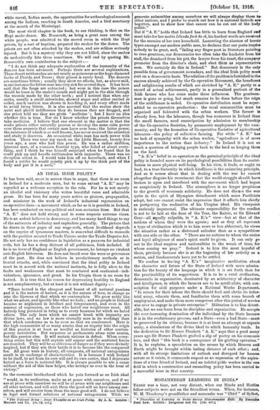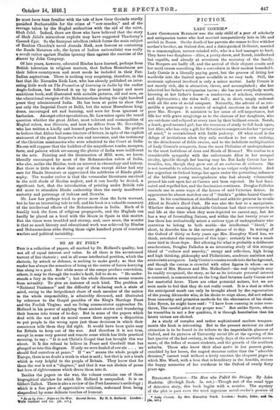MOHA313fEDAN LEARNING IN INDIA.*
Trizaz was a tinie, not very distant, when our Hindu and Muidins fellow-subjects were not on the friendliest terms. When, for instance, W. M. Thackeray's graildffither and namesake was. " Chief" of Sylhet, • Piordotion of Lelitrffirg its •Indift daring ellehabrosoitot ItsIe.- By Narendrs
Natt Law. London: Longnuuss and Co. 114s. net.) •
lie must have been fensiliar with the tale Of hOWGaur GnYin& cruelly punished Burhanudclin for the crime of "cow-murder," and of the revenge taken by tne Mughal authorities with the ,aid of the saint, Shah Jalal. Weed, there are t,hose who have believed that the story of Shah Jadars miraculous exploits may have suggested Thackeray's CPssaek Epic. So the Sannyasi rebellion (which farms the main subject of Bankirn Chandra's novel Almada Math, now famous as containing the Banda Mataram ode, the hymn of Indian nationalists) was really
xeyolt rather against Muslim tyranny than against the exercise of the iireani by John Company.
Of late years, however, educated Hindus have learned, perhaps from British toleration in religious matters, that Indian Mussulmans are their fellow-countrymen and must needs be included in their Pan- Indian aspirations_ There is nothing very surprising, therefore, in the fact that Mr. Narendre. Nath Law, who has already published an inter- feting little work on The Promotion of Learning in India by the earlier Anglo-Indians, has followed it up by the present larger and more ambitious book, well illustrated with suitable pictures, old and new, on the educational energies of the Mohammedans during the eight hundred years they administered India. He has been at pains to show that not only the Imperial Court at Delhi, but the minor Mussulman king- doms, encouraged art and learning, and were far from ignorant or barbaan. Amongst other speculations, Mr. Law raises again the vexed question whether the great Akbar, most tolerant and cosmopolitan of Mughal rulers, was illiterate, and here he differs from Mr. Beveridge, who has written a kindly and learned preface to his book. Ile prefers to believe that Akbar had some tincture of letters, in spite of the explicit statement of the great Emperor's son and successor, and the testimony of the Christian missionaries who were admitted to the Court at Delhi. Noone will suppose that the builders of the magnificent tombs, mosques, forts, and palaces which are among the glories of India were indifferent to the arts. Painting and the illumination of MSS. were, we know, liberally encouraged by most of the Mohammedan rulers of India, who also, unlike the Hindus, took an interest in chronology and history. But there is little to show that any of them except Akbar had any care for Hindu literature or appreciated the subtleties of Hindu philo- sophy. The wonder rather is that the vernacular literatures survived in the cold shade of Muslim neglect, and it can hardly be denied, a significant fact, that the introduction of printing under British rule did more to stimulate Hindu authorship than the rarely manifested curiosity and patronage of Sultans and Nawabs.
Mr. Law has perhaps tried to prove more than the facts warrant, but he has an interesting tale to tell, and his book is a valuable summary t1u3 intellectual efforts of the Mohammedans in India. Much of it frankly took the form of religious propaganda, and the Mughals can hardly be placed on a level with the Moors in Spain in this matter. But the times were troubled and stormy, and, once more, the wonder is that so much literary and educational work was achieved by Hindus and Mohammedans alike during those eight hundred years of constant warfare and political instability.



































 Previous page
Previous page